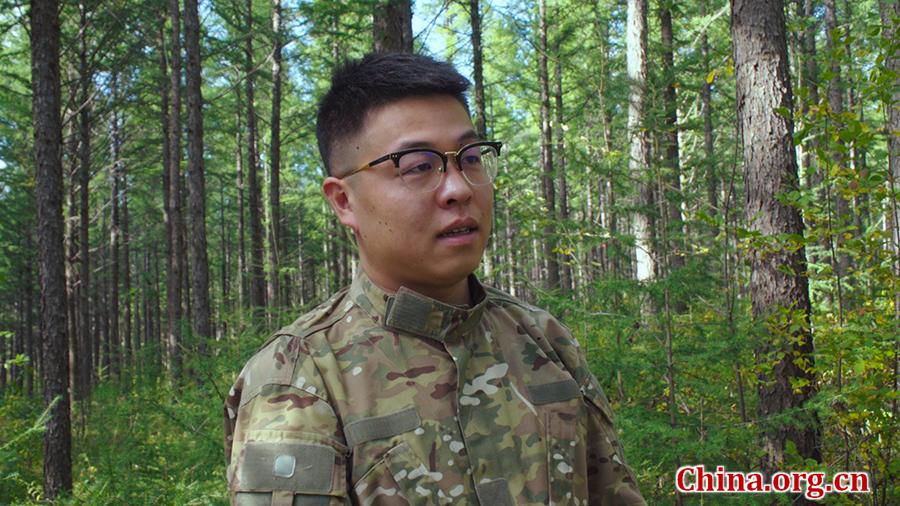Saihanba: A green miracle passed on from generation to generation
- By Cui Can
 0 Comment(s)
0 Comment(s) Print
Print E-mail China.org.cn, September 11, 2018
E-mail China.org.cn, September 11, 2018
Protecting the home
As an old Chinese saying goes, one generation plants the trees, and another gets the shade. But for Liu Jun, whose parents were among the first generation of fire lookouts, restoring Saihanba is more than just setting down the saplings.
"Planting trees is not enough; you need to carefully protect the woods and manage well the whole forest farm. And that's even harder," Liu said.

Liu Jun (L), 48, is a fire lookout at Saihanba. He and wife Qi Shuyan have been working at the forest farm for more than a decade. [File Photo/Xinhua]
From early in the morning every day, Liu uses binoculars and a variety of equipment to monitor the forest from his 18-meter-high watchtower of bricks and sheet iron, looking for signs of fire.
"A mere spark is enough to set a huge area ablaze."
The observation tower doubles as Liu's home, which the 48-year-old shares with wife Qi Shuyan. It is one of the nine observation towers scattered throughout the Saihanba area, each built 20 kilometers away from another to eliminate blind spots. The two are assigned watchtowers in rotating shifts. During fire prevention periods in spring and autumn, they watch over the vast expanse of forest every 15 minutes during the day, and once an hour at night. The couple has done this for the past 13 years.
"We were on tenterhooks during every fire-prevention period. All our mobile phones are required to be turned on 24/7 just in case of duty calls," Liu said. "If we don't make efforts to prevent fire, a huge blaze would reduce the entire range to a wasteland."
Standing atop the highest peak in the forest, the lowest temperature of Liu's workplace could reach minus 48 degrees Celsius in the depth of winter. "Inside the house, we burn logs to get warm," he said. "Even when the stove burns red hot, it would not be as warm as we expect, and one can stay still for only five minutes at the longest."
However, for Liu and his wife, it's easier to endure the wind and cold than the solitude.
"When winter comes, it can be extremely boring. Outside the tower, besides the noise of the wind mixed with the roar of wild beasts in the mountains, you can only hear your own breathing," Liu said. "The silence is so scary that it can drive a person crazy."
To combat this feeling of loneliness, Liu started painting. The walls of Liu's home are now filled with his paintings, including a depiction of the sea of green just outside his windows.
"I was lucky that the situation was better than that in the 1960s and 70s, when my parents could only live in the type of makeshift tent in the forest and had nothing to drink during the long winter but meltwater from the trees," he said. "They are the fearless guardians of the forest, and I am proud to be part of the group."
Liu said he plans to retire in about 10 years. "Taking care of this expanse of forest is my life's work, and I hope my children will take over my job someday."
Continuing the legacy
In the Memorial Forest, which is also known as the "origin of the green," Shi Chen, the 28-year-old tree planter is conducting his daily health check of a 30-meter-tall tree.
He said he was awed and inspired by the achievements made by the first generation of Saihanba foresters, especially their tenacity despite repeated failures during the first two years. "My grandfather and his colleagues made the last attempt and finally made it."

The 28-year-old Shi Chen is a third-generation tree planter living in and protecting Saihanba. [Photo by Sun Tao/China.org.cn]
As a third-generation tree planter in Saihanba, Shi Chen is now working to solve even more difficult problems in the never-ending afforestation effort.
Since there is much less flat land left for planting trees, Shi and his team have to work on the rocky mountain slopes where the topsoil is only 10 centimeters thick. But before giving the saplings a home, they need to dig holes about 40 centimeters deep.
The slope is too steep for machines, so everything must be done by hand. Shi and his colleagues have to hit the large rocks with spade and drills to dig as deep as 30 centimeters, while the shock of the iron gives forth sparks and smoke that is then swept up by the strong wind.
Every time Shi stands by the trees that his grandfather planted, he said he feels a connection between the present and the past. "It's like living with the history, especially when you understand how this greenery was born."
Shi always recounts the stories his grandfather used to tell him. "The elder generation has dedicated their whole life into winning the battles of afforestation, regardless of the hardships. None of them came here for honor or praise, but out of responsibility."
"He is the reason that I chose to come back," Shi said. "I want to continue his career no matter how tough the work would be. To be part of this epic, just like him."





Go to Forum >>0 Comment(s)